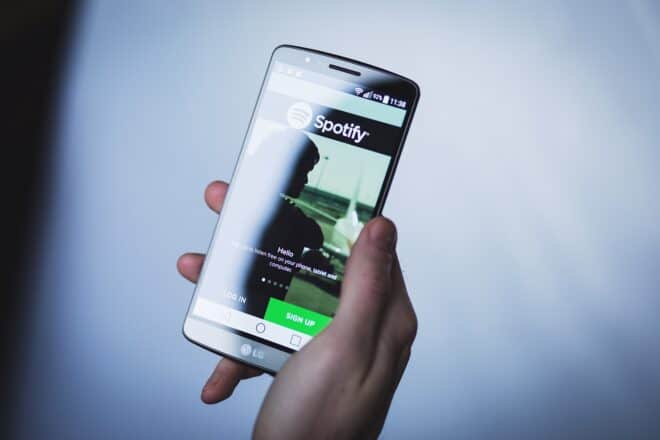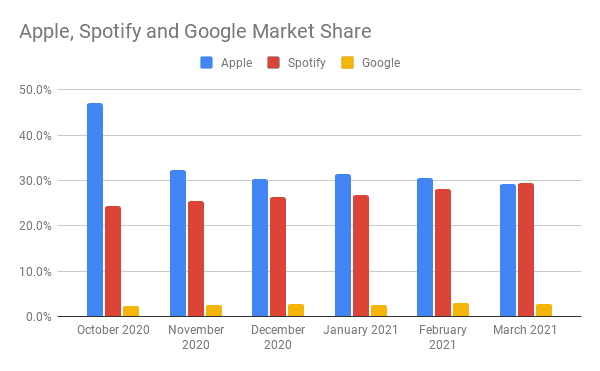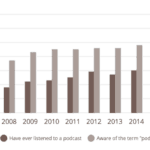Spotify overtakes Apple in podcast downloads

In April 2018, Spotify acquired podcast network Gimlet Media and podcast host, Anchor, unofficially announcing their serious bid to become a major player in the larger podcast landscape which at the time was mostly dominated by Apple. Since then they’ve bolstered their podcast arm with more acquisitions (Parcast, The Ringer, and Megaphone) and exclusive partnerships (Joe Rogan, Michelle Obama, and others). Three years after the Gimlet acquisition, Spotify has now surpassed Apple as the most popular podcast app, according to Buzzsprout.
Buzzsprout, a leading podcast host, aggregates their podcast base to get a representative sample size to provide the data. So while this data is a sampling of the overall podcast streaming, it’s compiled of millions of streams and there’s no reason to believe the data would benefit Spotify more than any other player. Slowly creeping up, Buzzsprout’s data shows Spotify commanded 29.4% of downloads compared to 29.3% from Apple.

Starting to measure in October 2020, Apple maintained a 47% market share versus Spotify’s 24.4%. Though nearly double, Buzzsprout’s CTO, Tom Rossi, tells me it’s likely due to an attribution error other podcasts hosts likely see as well. Two months later the two competitors were closer: Apple 30.3%, Spotify 26.4%.
Rossi says, “Whenever somebody downloads an episode from Buzzsprout, we have to determine which podcast app is making the download, where the listener is located in the world, and what type of device they are using.
There are a large group of downloads that were using something called Apple Core Media on iPhones. Until October 2020, we included these plays as being Apple Podcasts, but after digging into the data, we determined it was actually various apps that were using an Apple API and not properly identifying themselves. When we updated our data, this caused a significant drop in the number of plays we attributed to Apple Podcasts.”
Head of Marketing at Buzzsprout, Alban Brooke tells us, “in the past four years, Spotify has grown from not having podcasts on their platform to be neck and neck with Apple Podcasts as an industry leader. Instead of just pulling listeners from other podcast apps, they’ve primarily grown by introducing millions of new listeners to podcasts.”
It’s impossible to overstate how much of an advantage Apple started with. Apple was the first major audio player to support podcast RSS feeds, the Apple Podcast app comes native on every iPhone, they’re called “podcasts” because of the iPod. However, it seems the podcast market was never large enough (and still might not be) to merit significant resources to continue innovating and growing that side of the business. The app has been slow to adopt more advanced features found in other players, they’ve been hesitant to develop original content or sign exclusive partnerships, and have overall taken a complacent role in the industry.
While some will argue this hands-off approach has allowed podcasts to remain free and open — as opposed to Spotify’s largely closed garden strategy — the inaction has allowed competing apps to continue innovating and gain significant market share.
Not everyone has taken advantage of the opportunity. Google’s podcasting strategy hasn’t quite bore fruit. Instead of a dedicated app, they initially made podcasts available to stream within a mobile browser before creating a dedicated experience. This model, along with lacking substantial playing features, hasn’t enticed users. According to the same Buzzsprout data, they only have 2.8% of the market despite Android phones eclipsing their iOS competitors.
Further exemplifying this listener behavior change is a drill down on the device level. Despite Spotify overtaking Apple Podcasts as the preferred player, Apple devices still overwhelmingly dominate where users are listening from. 62.6% of streams come from the iPhone, 2.4% from an Apple Computer, 1.5% from an iPad, and still 0.1% from iPods. Android phones make up 24.1% of the streams.
According to Buzzsprout, Spotify may have a significant advantage in Spanish-speaking countries when it comes to podcasts. Brooke continues, “for a lot of our Spanish-speaking podcasts, Spotify is already their top podcast app. We think this is because Spotify initially was focused on introducing podcasts to new listeners rather than moving listeners from other listening apps.”













2 Comments
Pingback Spotify Has the Most Downloads in March - Podcast Business Journal
Pingback Educación, Sociedad-cultura, y las artes: las categorías con más capítulos de podcasts | Via Podcast
Comments are closed.